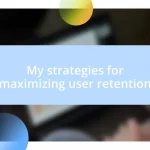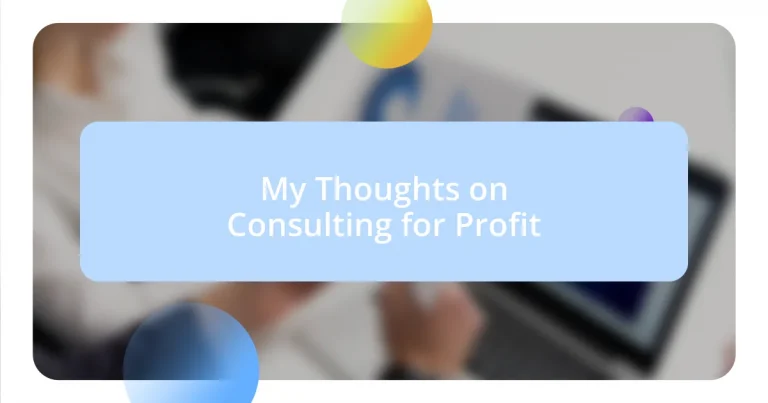Key takeaways:
- Successful consulting relies on understanding client needs, building trust, and showcasing your unique expertise.
- Key skills for consultants include analytical abilities, emotional intelligence, effective communication, and adaptability to evolving situations.
- Continuous improvement through client feedback and ongoing learning is essential for enhancing consulting effectiveness and fostering strong relationships.
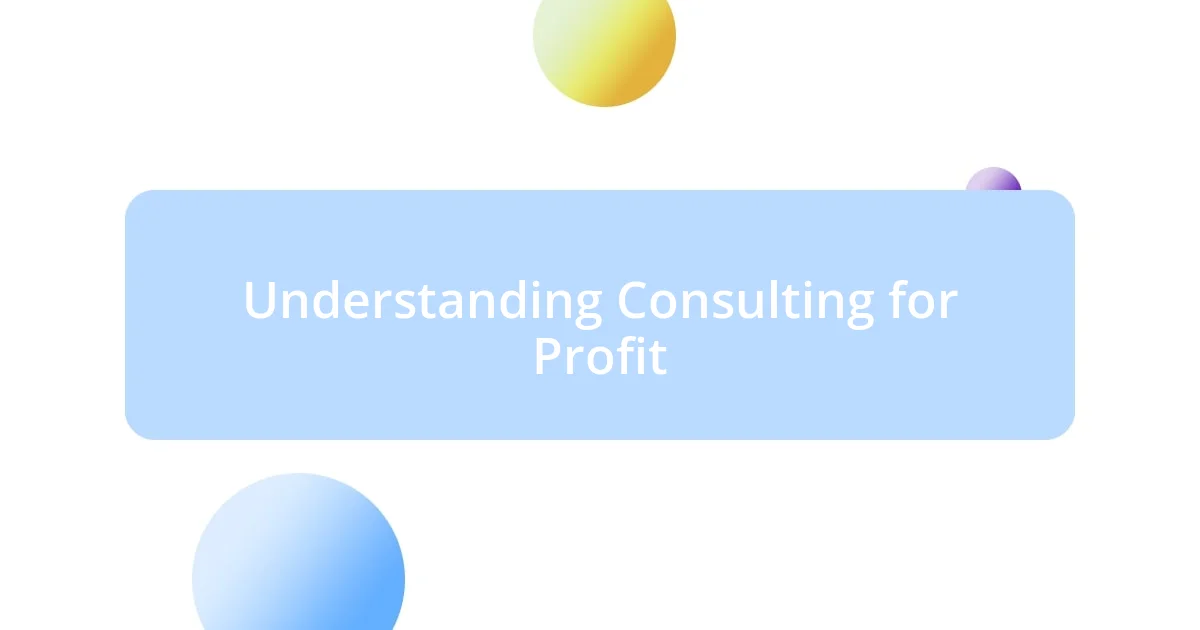
Understanding Consulting for Profit
Consulting for profit essentially means providing expert advice to businesses while also ensuring that the engagement is lucrative. I remember my first dive into this realm; I felt a mix of excitement and trepidation as I realized my expertise could translate into tangible solutions for clients. Have you ever stopped to think about how your knowledge can not only help others but also contribute to your financial wellbeing?
In my experience, successful consulting hinges on understanding client needs deeply. Building trust becomes vital during this process. I once worked with a startup that needed guidance on streamlining their operations, and our discussions led to not just processes improvement but a lasting partnership. This emotional connection made me appreciate that consulting isn’t just about providing answers; it’s about fostering relationships that add value.
Moreover, I believe that positioning yourself as an authority in your niche is crucial. Clients are often looking for someone who not only knows the theory but has real-world experience to back it up. When I share my own journey and the lessons learned along the way, I can see the shift in their perception. It raises an important question: how can you showcase your unique story to stand out in the consulting industry?
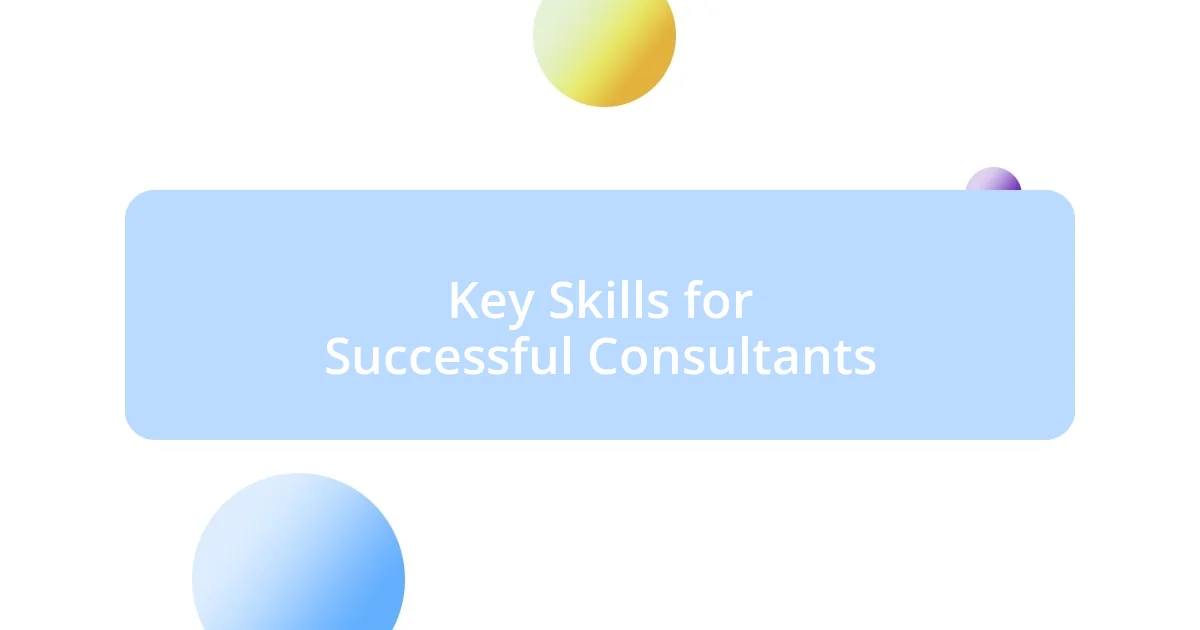
Key Skills for Successful Consultants
Successful consultants possess a blend of analytical skills and emotional intelligence. I’ve found that being able to dissect complex problems while also empathizing with clients is invaluable. For instance, during a challenging project with a corporate client, I had to balance numbers and metrics while keeping an open ear to their concerns about team morale. This duality not only helped me craft effective solutions but also strengthened our working relationship.
Another crucial skill is effective communication. The ability to convey complex ideas clearly is fundamental. I recall presenting recommendations to a board of directors where I transformed intricate data into engaging visuals and relatable stories. This experience reaffirmed my belief that consulting isn’t just about what you know; it’s about how you share that knowledge. Have you ever considered how the way you present your ideas can impact your client’s trust in you?
Lastly, adaptability stands out as a key trait for consultants. The business landscape is ever-evolving, and the ability to pivot in response to new information is essential. I remember a time when a client shifted their focus mid-project, and my willingness to adapt and explore new avenues allowed me to deliver solutions that fit their new direction seamlessly. What strategies do you have to remain flexible in your consulting approach?
| Key Skill | Description |
|---|---|
| Analytical Skills | Ability to dissect complex problems and identify effective solutions. |
| Emotional Intelligence | Understanding and responding to clients’ emotional needs and concerns. |
| Effective Communication | Conveying ideas clearly and engagingly to maintain client trust. |
| Adaptability | Willingness to change direction based on client needs and external factors. |
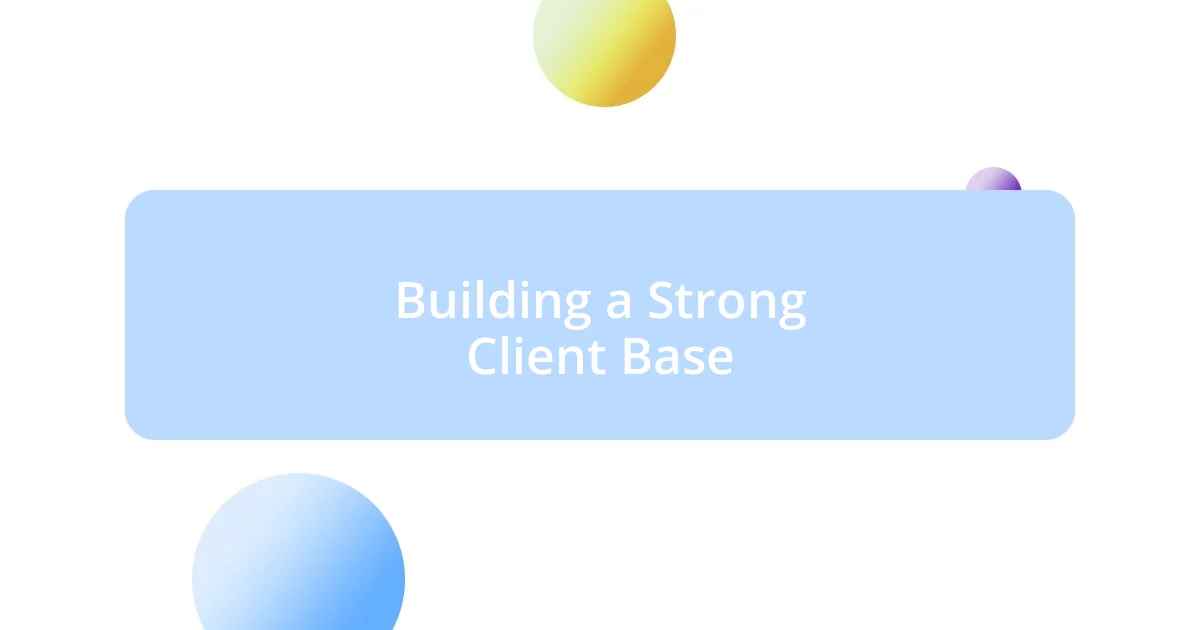
Building a Strong Client Base
Building a strong client base is one of the most rewarding aspects of consulting. I vividly recall a networking event where I struck up a conversation with a fellow business owner. It turned into a lengthy discussion about challenges they faced, and I shared tailored advice. That simple exchange later blossomed into a rewarding consulting relationship. It reminded me that often, it’s those personal interactions that can lay the groundwork for future collaborations. Clients appreciate when consultants go the extra mile to understand their situation.
Here are some strategies that have helped me in establishing a robust client base:
- Leverage Social Media: I’ve found that engaging with potential clients through platforms like LinkedIn is powerful. Sharing informative content showcases your expertise and draws people in.
- Network Intentionally: Attend industry events and create authentic connections. I often follow up with people I meet, reinforcing the relationship through personalized messages.
- Ask for Testimonials: When clients are satisfied, I encourage them to share their experiences. Word-of-mouth really does work wonders in building credibility.
- Provide Value Upfront: Offering free workshops or insights can spark interest. I’ve seen firsthand how an initial gift of knowledge can lead to long-term partnerships.
- Stay Consistent: Regular communication with past clients fosters loyalty. I make it a point to check in, even if it’s just a quick message to say hello.
Establishing a strong client base is not merely transactional; it’s about nurturing connections that evolve over time. It’s like sowing seeds – with care, attention, and time, you can cultivate an impressive garden of professional relationships.
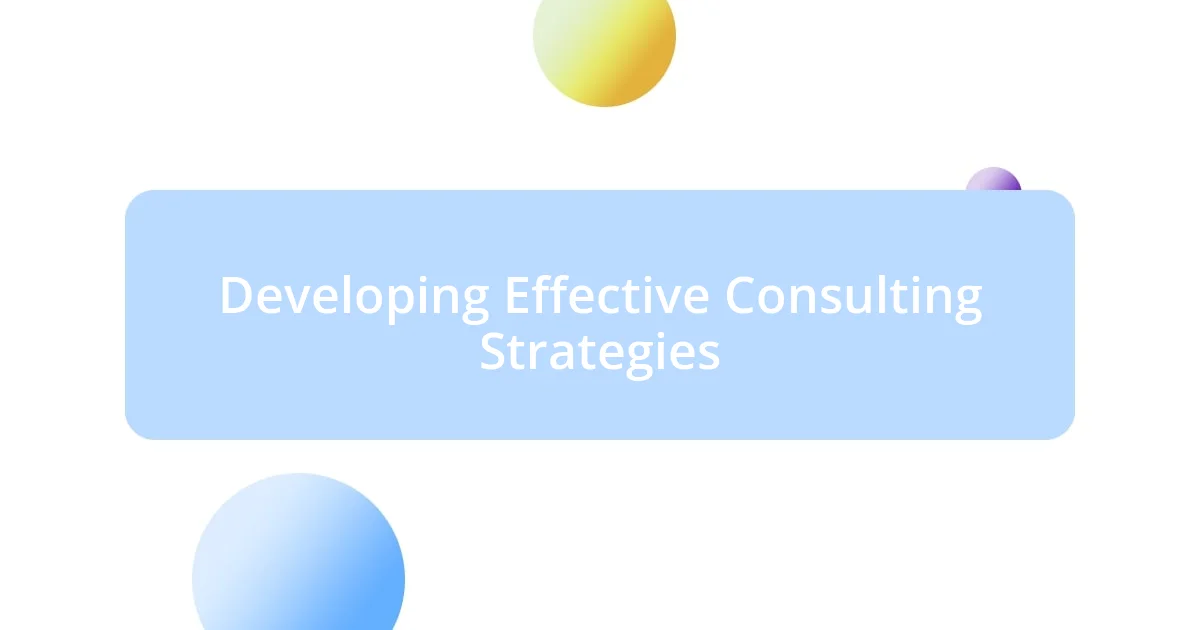
Developing Effective Consulting Strategies
Developing effective consulting strategies begins with thorough research on the industry and client needs. I remember a project where my deep dive into market trends revealed insights that completely shifted my client’s product strategy. Isn’t it fascinating how a well-informed perspective can unlock new opportunities? I believe this foundational knowledge not only enhances the quality of recommendations but also builds client trust right from the start.
Next, I focus on collaborative goal-setting with clients. During one engagement, we sat down together to outline specific, measurable objectives. This approach not only clarified our direction but also empowered my client, making the process feel more like a partnership. Have you ever noticed how clients are more invested when they have a hand in shaping their path forward? This shared ownership can significantly enhance commitment to the outcomes we aim to achieve.
Finally, continuous feedback is essential in refining strategies. Early on in my consulting journey, I developed a habit of checking in regularly, encouraging clients to share their thoughts. I once conducted a brief survey after a project, only to discover areas that needed adjustment. That experience taught me how valuable honest communication can be in evolving my strategies to better align with client expectations. How do you incorporate feedback into your own consulting practice? Embracing this dialogue can significantly elevate your effectiveness and strengthen client relationships.
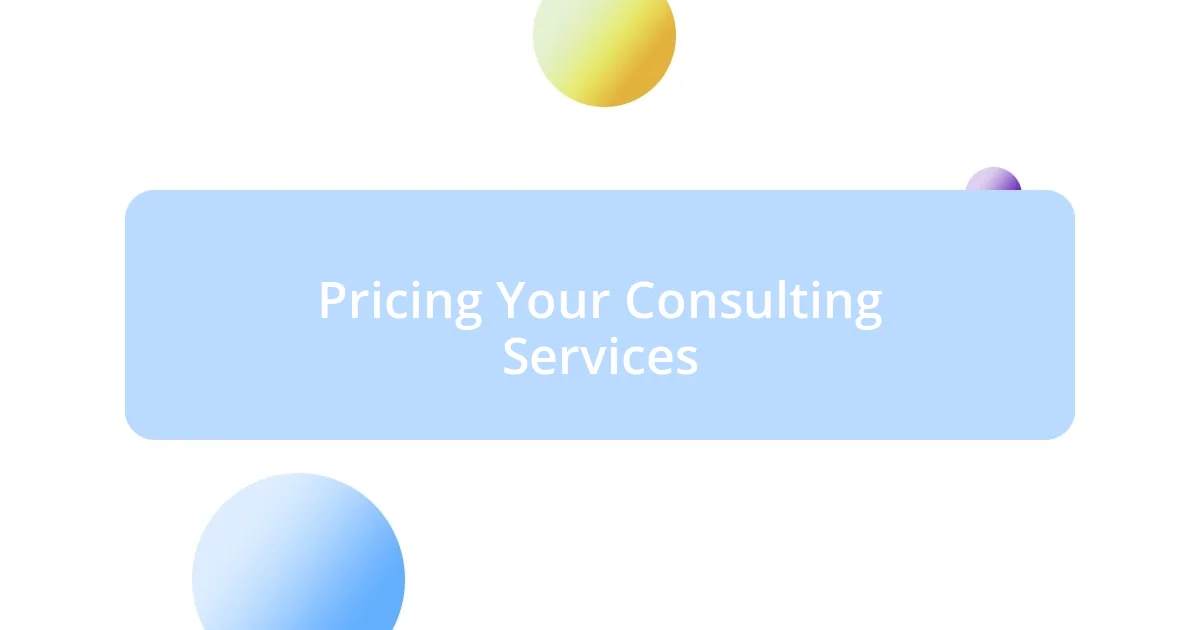
Pricing Your Consulting Services
When it comes to pricing your consulting services, I’ve learned that clarity is essential. I recall a time early in my career when I hesitated to state my rates for fear of scaring potential clients away. But when I finally laid out my pricing upfront, it not only eased my anxiety but fostered trust. It made me wonder—aren’t clients more likely to respect someone who is confident about their worth?
I’ve also found that aligning your prices with the value you deliver can significantly impact how clients perceive your services. For instance, after completing a project that saved a client thousands, I adjusted my fees to reflect the substantial benefits I provided. I still remember their reaction—appreciation mixed with a sense of validation. It was an eye-opener for me: charging based on results can lead to more fulfilling relationships and better project outcomes.
Lastly, don’t underestimate the importance of flexibility in your pricing strategy. In one instance, I tailored a package for a startup looking for more affordable options. By offering them a scaled-down version of my services, I not only secured a new client but also forged a partnership that later blossomed into a lucrative contract. It leaves me thinking—how often do we overlook opportunities simply because we stick to rigid pricing models? Being adaptable can truly open doors that might otherwise remain closed.
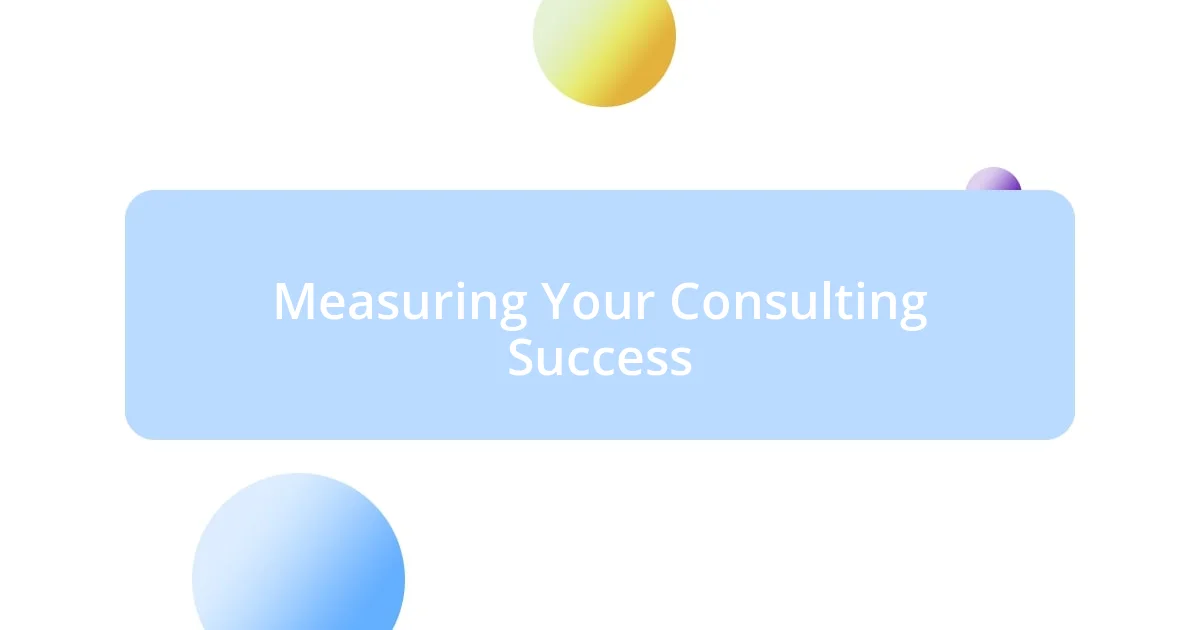
Measuring Your Consulting Success
To measure consulting success, I’ve found that client feedback is crucial. Early on, I implemented a post-project evaluation to understand my impact better. One client remarked how my recommendations not only improved their efficiency but also boosted their team morale. It really struck me then—success isn’t just about numbers; it’s about the transformation we facilitate in organizations.
Another metric I value is the repeat business rate. I remember a particular client bringing me back for multiple projects because they appreciated the growth we achieved together. It made me realize that successful consulting builds lasting relationships, and those relationships often translate into loyalty. Does it feel rewarding to see clients return? It definitely reinforces the idea that our work must resonate with their needs and aspirations.
Lastly, tracking project outcomes against initial goals can shed light on overall success. There was a time I used a simple spreadsheet to compare objectives with results, and the outcomes surprised me. Some projects exceeded expectations, while others fell short. This honest analysis allowed me to refine my future strategies. How often do we reflect on our progress and learn from it? I’ve discovered that introspection is an indispensable part of growth as a consultant.
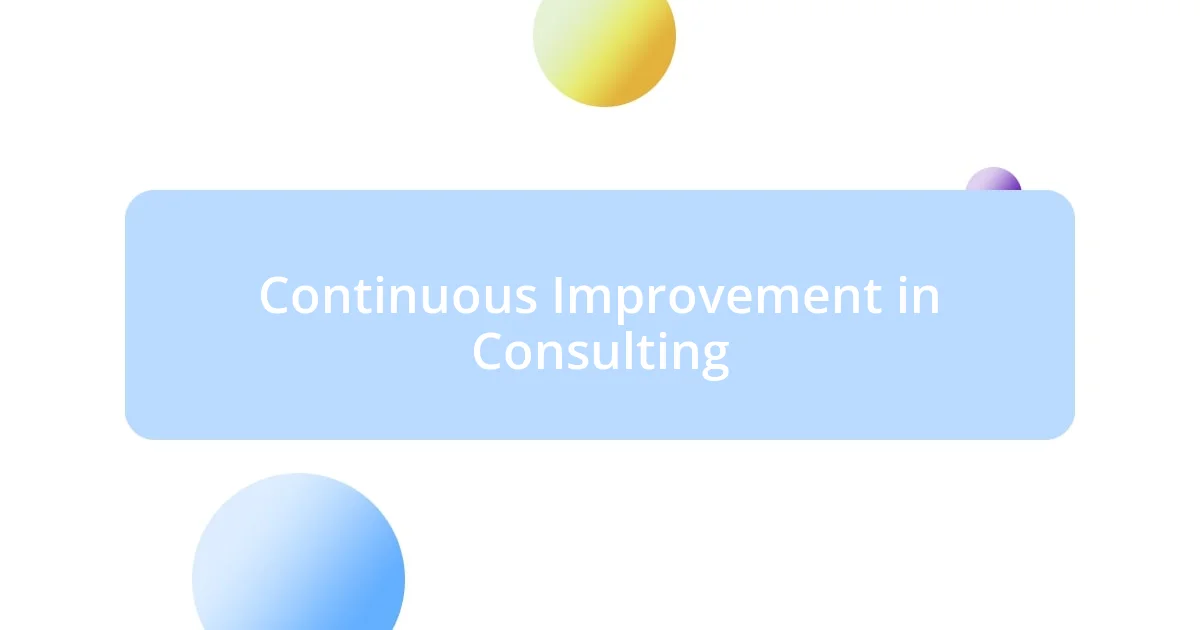
Continuous Improvement in Consulting
Continuous improvement is at the heart of effective consulting. I vividly recall a project where I realized that my methodologies were becoming stale. I sought feedback from my client, and their honest critique helped me pivot to more innovative strategies. It felt liberating to embrace change, and it made me wonder—are we too often stuck in our comfort zones?
Engaging in continuous learning has been pivotal in my consulting journey. One year, I devoted time to attending workshops and webinars, which introduced me to groundbreaking ideas. I was amazed at how these fresh insights not only enriched my skill set but also reignited my passion for my work. It leads me to ask—how can we expect to deliver value if we don’t continually expand our horizons?
Moreover, I believe that fostering a culture of improvement with clients is essential. During a recent collaboration, we established weekly feedback sessions. These conversations revealed areas for enhancement that neither party had considered initially. It was eye-opening to see how small adjustments based on ongoing dialogue could lead to significant progress. This experience made me reflect—what if we all embraced the potential of continuous improvement in every consulting relationship?







